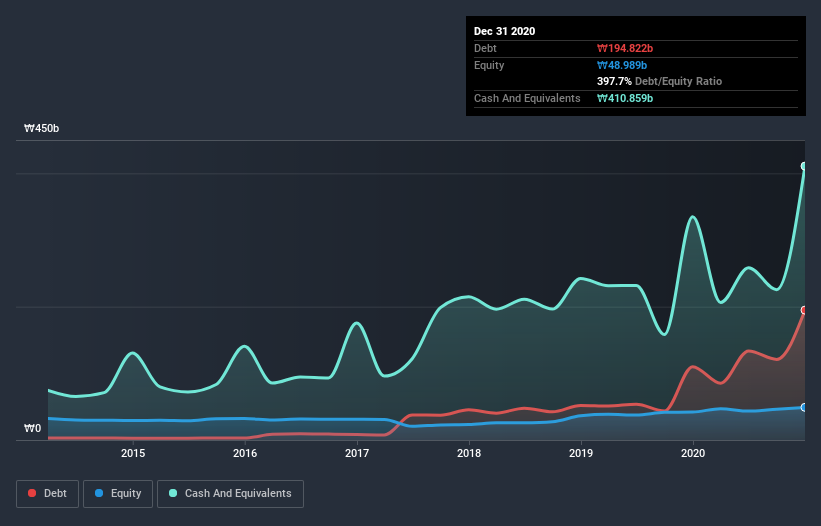- South Korea
- /
- Diversified Financial
- /
- KOSDAQ:A950110
SBI FinTech Solutions (KOSDAQ:950110) Has A Somewhat Strained Balance Sheet
The external fund manager backed by Berkshire Hathaway's Charlie Munger, Li Lu, makes no bones about it when he says 'The biggest investment risk is not the volatility of prices, but whether you will suffer a permanent loss of capital.' It's only natural to consider a company's balance sheet when you examine how risky it is, since debt is often involved when a business collapses. We note that SBI FinTech Solutions Co., Ltd. (KOSDAQ:950110) does have debt on its balance sheet. But should shareholders be worried about its use of debt?
When Is Debt Dangerous?
Debt is a tool to help businesses grow, but if a business is incapable of paying off its lenders, then it exists at their mercy. In the worst case scenario, a company can go bankrupt if it cannot pay its creditors. However, a more frequent (but still costly) occurrence is where a company must issue shares at bargain-basement prices, permanently diluting shareholders, just to shore up its balance sheet. Of course, the upside of debt is that it often represents cheap capital, especially when it replaces dilution in a company with the ability to reinvest at high rates of return. When we examine debt levels, we first consider both cash and debt levels, together.
See our latest analysis for SBI FinTech Solutions
What Is SBI FinTech Solutions's Debt?
As you can see below, at the end of December 2020, SBI FinTech Solutions had ₩194.8b of debt, up from ₩110.0b a year ago. Click the image for more detail. However, it does have ₩410.9b in cash offsetting this, leading to net cash of ₩216.0b.

How Healthy Is SBI FinTech Solutions' Balance Sheet?
We can see from the most recent balance sheet that SBI FinTech Solutions had liabilities of ₩384.7b falling due within a year, and liabilities of ₩67.0b due beyond that. Offsetting these obligations, it had cash of ₩410.9b as well as receivables valued at ₩10.2b due within 12 months. So its liabilities total ₩30.7b more than the combination of its cash and short-term receivables.
Given SBI FinTech Solutions has a market capitalization of ₩198.9b, it's hard to believe these liabilities pose much threat. But there are sufficient liabilities that we would certainly recommend shareholders continue to monitor the balance sheet, going forward. While it does have liabilities worth noting, SBI FinTech Solutions also has more cash than debt, so we're pretty confident it can manage its debt safely.
On the other hand, SBI FinTech Solutions saw its EBIT drop by 2.1% in the last twelve months. That sort of decline, if sustained, will obviously make debt harder to handle. There's no doubt that we learn most about debt from the balance sheet. But ultimately the future profitability of the business will decide if SBI FinTech Solutions can strengthen its balance sheet over time. So if you want to see what the professionals think, you might find this free report on analyst profit forecasts to be interesting.
Finally, a company can only pay off debt with cold hard cash, not accounting profits. SBI FinTech Solutions may have net cash on the balance sheet, but it is still interesting to look at how well the business converts its earnings before interest and tax (EBIT) to free cash flow, because that will influence both its need for, and its capacity to manage debt. Over the last three years, SBI FinTech Solutions saw substantial negative free cash flow, in total. While that may be a result of expenditure for growth, it does make the debt far more risky.
Summing up
Although SBI FinTech Solutions's balance sheet isn't particularly strong, due to the total liabilities, it is clearly positive to see that it has net cash of ₩216.0b. So while SBI FinTech Solutions does not have a great balance sheet, it's certainly not too bad. The balance sheet is clearly the area to focus on when you are analysing debt. However, not all investment risk resides within the balance sheet - far from it. These risks can be hard to spot. Every company has them, and we've spotted 2 warning signs for SBI FinTech Solutions (of which 1 makes us a bit uncomfortable!) you should know about.
If you're interested in investing in businesses that can grow profits without the burden of debt, then check out this free list of growing businesses that have net cash on the balance sheet.
If you’re looking to trade SBI FinTech Solutions, open an account with the lowest-cost* platform trusted by professionals, Interactive Brokers. Their clients from over 200 countries and territories trade stocks, options, futures, forex, bonds and funds worldwide from a single integrated account. Promoted
New: Manage All Your Stock Portfolios in One Place
We've created the ultimate portfolio companion for stock investors, and it's free.
• Connect an unlimited number of Portfolios and see your total in one currency
• Be alerted to new Warning Signs or Risks via email or mobile
• Track the Fair Value of your stocks
This article by Simply Wall St is general in nature. It does not constitute a recommendation to buy or sell any stock, and does not take account of your objectives, or your financial situation. We aim to bring you long-term focused analysis driven by fundamental data. Note that our analysis may not factor in the latest price-sensitive company announcements or qualitative material. Simply Wall St has no position in any stocks mentioned.
*Interactive Brokers Rated Lowest Cost Broker by StockBrokers.com Annual Online Review 2020
Have feedback on this article? Concerned about the content? Get in touch with us directly. Alternatively, email editorial-team (at) simplywallst.com.
About KOSDAQ:A950110
SBI FinTech Solutions
A fintech solution company, payment agency service and international remittance services in Japan.
Acceptable track record with mediocre balance sheet.
Market Insights
Community Narratives




